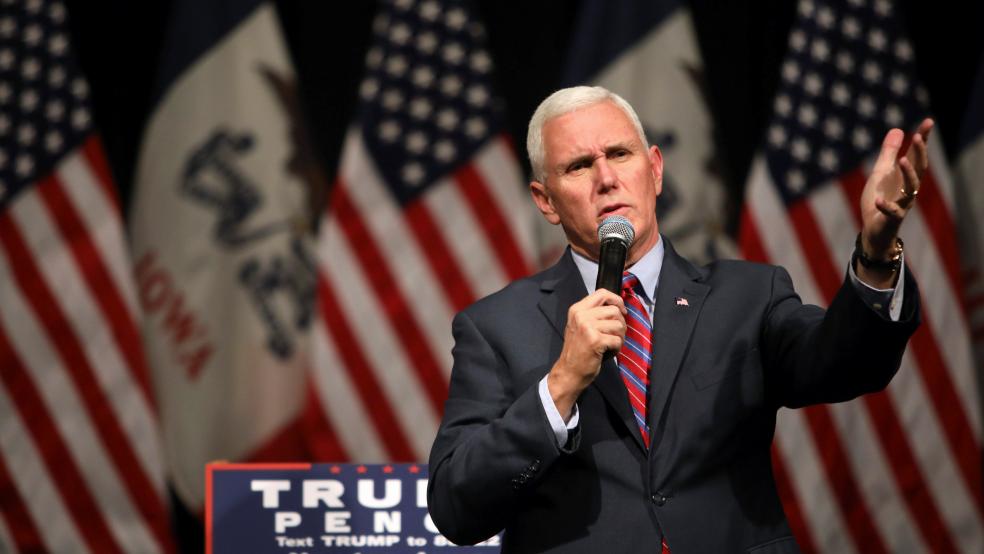In the immediate aftermath of last month's stunning election, there was talk across the media, both social and mass, that Vice President-elect Mike Pence might be shaping up to be something of a shadow president. Named to lead the president-elect's transition team, Pence has reportedly been taking regular intelligence briefings — which the future president has eschewed — and holds policy positions that consistently align with the ascendant far-right of the Republican Party — unlike Trump, whose stated opinions often appear to be swayed by considerations of personal brand or, indeed, ego.
The past month has produced a firehose of shocking news, however, and thoughts of Pence playing an outsized role in the Trump White House have faded somewhat as Americans try to grapple with a future commander-in-chief who conducts Twitter fights and threatens global stability with a few phone calls. It's understandable.
Related: Just 40% of Americans Approve of Trump’s Cabinet Choices
Understandable, but unwise. As Stephen Myrow, former Treasury Department official under George W. Bush, said last month, "The one person people aren't talking enough about is Vice President-elect Mike Pence."
Pence already appears to be putting an enormous stamp on the incoming administration. Rep. Mike Pompeo (R-Kan.), close enough to Pence to be his debate coach, has been tapped to direct the CIA; Seema Verma, named administrator of the Centers for Medicare and Medicaid Services, designed Pence's ObamaCare expansion model in Indiana; Tom Price, Trump's pick for the Department of Health and Human Services, has chaired the Republican Study Group, the same influential House Republican caucus once also chaired by Pence.
Simply put, it would behoove Americans to pay close attention to the plans and ideas of the man set to be a heartbeat away from the Oval Office. What makes Mike Pence's heart tick?
One thing we know is that Pence is deeply devoted to undermining the human and civil rights of the LGBTQ community. He believes preventing marriage equality would realize "God's idea" about marriage; he's a supporter of so-called "conversion therapy"; in May, he opposed President Obama's directive on the rights of transgender students in school bathrooms.
Related: How Trump’s Cabinet Picks Are Payback to His Wealthy Pals
These opinions spring from Pence's sense of himself as "a Christian, a conservative, and a Republican, in that order." Millions of American Christians steadfastly oppose Pence's views on sexuality and gender identity (and the president-elect once described himself as "much better for the gays" than Hillary Clinton), but many of the Republican Party's staunchest Christians agree with the vice president-elect, not least Speaker of the House Paul Ryan. Notably, Pat McCrory, the narrowly defeated incumbent governor of North Carolina best known for a law denying transgender bathroom access rights, met with Trump this Wednesday.
On the issue of abortion and the existence of Planned Parenthood Trump has gone back and forth; not so Pence, who has devoted enormous energy to stripping American women of reproductive choice, also out of a sense of religious conviction. His relentless efforts to defund and destroy Planned Parenthood in his home state mirrored efforts on the national level by Congressional Republicans.
As for the role that America plays in the world, though Trump appears to be motivated at least in part by his own financial dealings (or those of his daughter), Pence is a hardline hawk. Both men have enthusiastically promised to "rip up" the Obama administration's deal with Iran (in accord with congressional Republicans), but they disagree fundamentally on Russia and Vladimir Putin, as well as on NATO.
Both Pence and Ryan have said that they're not unduly concerned with Trump's potential financial conflicts of interest, however, and the appointments Pence has overseen so far paint a picture not just of "hawkishness" but full-throated aggression — Pompeo vigorously opposed the Iran deal; retired Marine General James Mattis, secretary of defense nominee, was so hardline on Iran that the Obama White House chose to retire him; Michael Flynn, tapped as Trump's national security adviser, is a conspiracy theorist with an especially alarming animus toward Islam and a penchant for "global war." When combined with Trump's inconsistent approach, it looks very much like the vice president-elect and the speaker of the House are willing to risk foreign policy chaos in pursuit of American hegemony (as to what they think about an erratic president having control over our nuclear arsenal, that's anyone's guess).
To again quote Stephen Myrow: "Trump doesn't strike anyone as a president who's going to be focused on the details… he's going to be leaving a lot of the actual work to be done up to the Republican-led Congress, and Pence is the one with the tightest relationships there" — which, according to a survey of Republican operatives conducted by Politico, most GOP insiders would welcome, as they'd prefer the speaker lead on policy, rather than the president-elect.
Presidents and House speakers tend to get a lot of attention; vice presidents, on the other hand, not so much. The role is ill-defined and if the person filling it doesn't enjoy courting the press, their actions and influence can slip under the radar.
With Vice-President Mike Pence on deck, however, America had better start paying much closer attention — his shadow is likely to loom very large indeed.
This article originally appeared on The Week. Read more from The Week:
The rise of the Rorschach candidate
Which states got screwed worst by the Electoral College in 2016?
How Marco Rubio is stealthily pushing Donald Trump to save the working class




